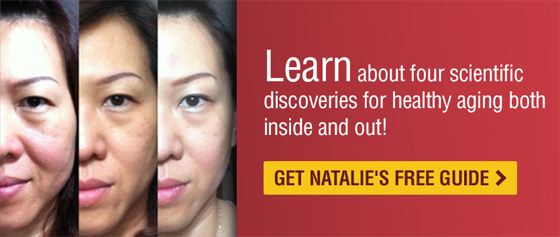Aging: How Old Are You Really?
 Contributed by
Natalie Turner
June 20, 2015
Contributed by
Natalie Turner
June 20, 2015


Next week, I am going to find out how old I am. What do you mean I hear you ask, surely you know your own age? Wrong. Whilst I might be 48 on my next birthday, my real age, the age of the cells within my body may or may not be the same.
I didn’t know anything about biological age until a few months ago when I started researching the new science of aging. My introduction to products that claimed to reverse aging and protect my cells from disease, led me on a quest to find out more.
Telomeres: the key to the aging process
I started by doing what we all do these days when we are curious to find out new information: I turned to Google. Heard of telomeres? No, neither had I, but apparently, we are only as young as our shortest telomeres, that can be found at the end of our chromosomes that protect the DNA in our cells. Think of the plastic cap at the end of a shoelace that stops itself from fraying.
So why are healthy, long telomeres important? How the body ages is complex, and I am only in the early stages of learning about these new discoveries, but what I have found out is that the potential for us to live long and healthy lives is in our cells. Life is a balance between degradation and restoration, and our DNA is permanently in this battle hundreds of thousands of times a day.
Internally we are battling oxidation, inflammation and glycation, a chemical reaction due to sugar consumption, and externally we are battling environmental toxins, pollution and the consequences of unhealthy stressful, living. This is what ages our cells.
How the body ages
Our cells replicate themselves to maintain a healthy system, but gradually they become too short and are no longer able to carry out critical functions, they self-destruct and eventually die. When cells stop functioning they spew out dangerous free radicals and inflammatory molecules that damage nearby cells. Thousands of studies show the connection between short telomeres and the process of cellular aging.
As I continued my exploration, I came across the work of Dr. Elizabeth Blackburn from the University of California, who through her break through research, discovered telomerase, an enzyme that can replenish and lengthen telomeres. For this work, she and two colleagues, were awarded the 2009 Nobel Prize in Medicine.
Aging: Can it be reversed?
Being a curious type, I started to wonder if there was a blood test that existed that could measure these short telomeres. I wanted to find out how mine were doing, as in how healthy my body is at the cellular level, before taking Finiti, a product provided by Jeunesse Global. Finiti includes a nutrient - TA65 - that naturally enhances this enzyme telomerase that Dr. Blackburn discovered.
Through reading an article from a UK newspaper online, I found a company called Life Length, a bio tech business based in Madrid that has invented the technology to measure shortest telomeres. I emailed them to find out more and one of their top scientists just happened to be in Singapore at a stem cell conference that afternoon.
Three hours later, my husband and I, and this scientist from Madrid, were having dinner at One Altitude restaurant in Singapore, discussing telomeres, these things I had never even heard of, over a juicy piece of steak. Three months later, I am writing this blog on a plane on my way to Spain to get my telomeres measured.
Time to challenge existing paradigms
So what can we do to ensure we are aging well, the healthiest way we can? Not just for our internal organs, but also how for how we look, the appearance of our skin. We will explore strategies for this in future blogs, but firstly, educating ourselves about what causes aging and redefining old paradigms and beliefs about what we thought to be true is critical. Scientific knowledge about aging is accelerating and the conventional wisdom about age being the accumulation of years is losing its validity.
So, the next time someone asks you your age, pause for a moment and reflect. You never know, your biological age could be younger than the years you have lived so far. It could also be older. In a few weeks, I will be able to tell you my results and share with you the feedback from one of the top anti-aging doctors in Madrid. Nothing is known to stop aging, but healthy cells equal healthy internal systems, healthy systems equal a healthy body and a healthy body equals a stronger, healthier and hopefully a happier you.
Visit the Energise Life page to find out more about Natalie's work.
Did you enjoy this post? Please comment, like and share!











Sorry, the comment form is closed at this time.